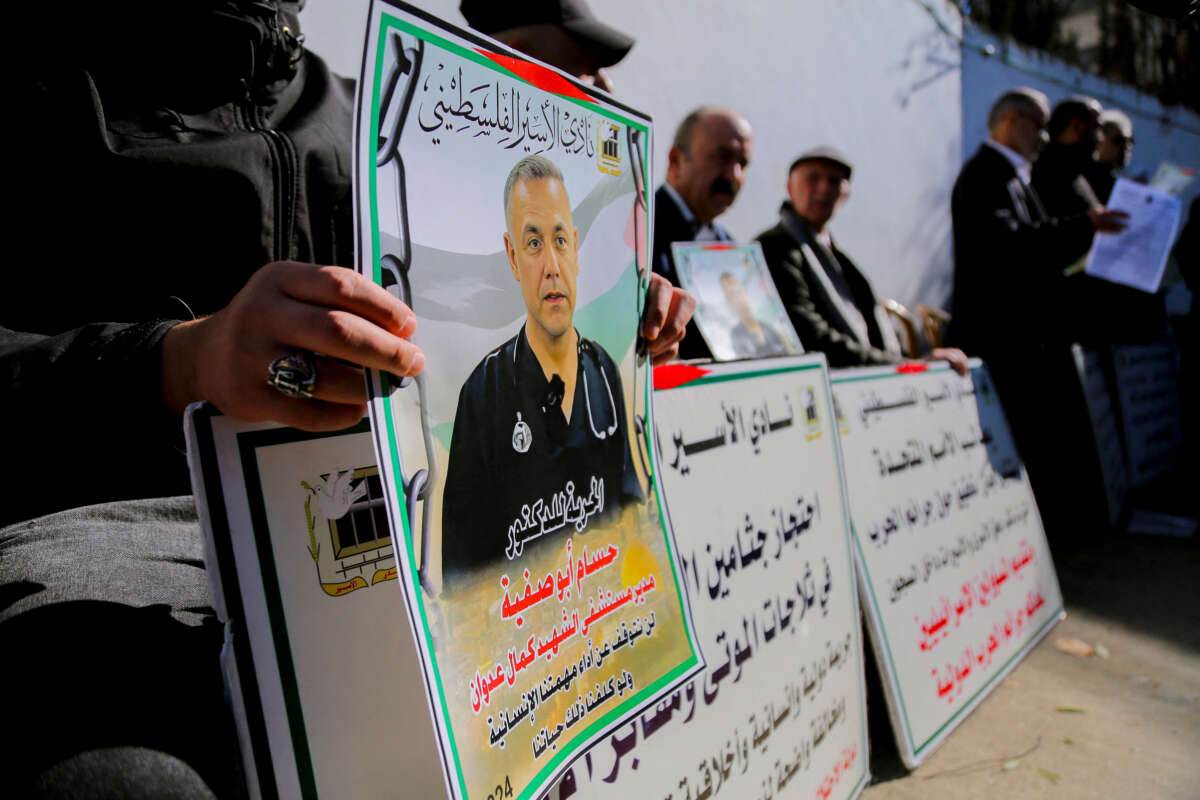An Israeli court upheld and extended north Gaza doctor Hussam Abu Safiya’s detention in a notorious Israeli torture camp for another six months on Tuesday, based on “secret evidence” submitted by prosecutors.
The decision by the Israeli district court was based on a secret file submitted to the court that both the prosecution and the court refused to disclose to Abu Safiya’s legal team, according to Al Mezan Center for Human Rights, which is representing the doctor in court.
“[T]he extension of Dr. Abu Safiya’s arbitrary detention by the Be’er Sheva District Court is a clear breach of international law, particularly the fundamental right to a fair trial,” Al Mezan said in a statement. “Neither the court nor the prosecution disclosed the charges or the purported secret evidence on which the case was based, effectively denying the defense any opportunity to contest the allegations — a core component of due process.”
“This decision further underscores the complicity of Israeli civilian courts in sustaining Israel’s illegal occupation of Palestinian territory and enforcing its apartheid regime against the Palestinian people,” the statement continued.
Abu Safiya, a pediatrician and director of Kamal Adwan Hospital in north Gaza, has been held without charges by Israeli forces since December 27, when the Israeli military raided and destroyed the hospital and detained staff there.
He was first held at Sde Teiman prison and was later transferred to Ofer prison in the occupied West Bank. Both prison camps are notorious for the horrific torture conducted by Israeli officers on Palestinians there.
The doctor was denied access to his legal team for the first 47 days of his detention, and has faced torture and denial of medical attention in his nearly three months in detention. In one of these instances of torture, he suffered a serious injury to the eye, his lawyer Ghaid Qassem said recently.
Qassem has also said that Israeli forces held Abu Safiya in solitary confinement — a form of torture — for 25 days at one point during his time in Ofer prison, in a tiny room.
He has also been subject to numerous interrogations, Qassem has said, one of them going on for 13 days in a row, with each session lasting six to eight hours, in an attempt to get Abu Safiya to confess to being a combatant.
Numerous human rights groups and experts have called for Abu Safiya to be released, in accordance with international humanitarian law.
Our most important fundraising appeal of the year
December is the most critical time of year for Truthout, because our nonprofit news is funded almost entirely by individual donations from readers like you. So before you navigate away, we ask that you take just a second to support Truthout with a tax-deductible donation.
This year is a little different. We are up against a far-reaching, wide-scale attack on press freedom coming from the Trump administration. 2025 was a year of frightening censorship, news industry corporate consolidation, and worsening financial conditions for progressive nonprofits across the board.
We can only resist Trump’s agenda by cultivating a strong base of support. The right-wing mediasphere is funded comfortably by billionaire owners and venture capitalist philanthropists. At Truthout, we have you.
We’ve set an ambitious target for our year-end campaign — a goal of $250,000 to keep up our fight against authoritarianism in 2026. Please take a meaningful action in this fight: make a one-time or monthly donation to Truthout before December 31. If you have the means, please dig deep.
